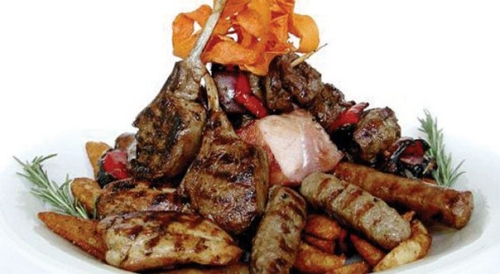Serbian cuisine is a mixture of various influences, that is empires that we were taken by.
So north of Serbia is strongly influenced by Austro-Hungarian cuisine, emphasizing that it is a region where wheat is a primary product in agriculture. Besides that, it is a cuisine with very strong and heavy food - pork, chicken or even fish - strong spices, often hot, in a lot of fat. It is a fact that agriculture needs some very strong people and you must have enough energy through the day. The menu is typically northern - pork chops, ribs, potatoes, sausages, goulash (Hungarian, but quite domestic here), with a lot of pasta - like side dishes, hand made of course. Still, a lot of vegetables are included in such a diet, softening a bit that fattening food style.
My favourite part, cakes! Strong, sweet and heavy. Most of them have Hungarian and German names - starting with palatchinken (pancakes, around 1mm in thickness), Schnee-nockerl, noodles with plums and with Dobos, Schwarzwald and other delicious cakes of such names. A lot of chocolate, hazelnuts and almond.
Southern - Eastern Serbia is strongly and mainly influenced by Ottoman empire. And of course, many dishes have Turkish, Greek or Byzantine names. For breakfast you will find bourek (ok, in Turkey it will not be that greasy and with pork, but in Serbia it is a stroke waiting to happen) with home made yogurt, for lunch beans, stuffed peppers (in fact peppers in any meal), all sorts of dishes with minced meat, barbecue (that is actually Serbian fast food with actual meat in it), roast - usually the entire animal. Cheese and milk products are a part of every meal.
Again, sweets!!! Baklava made primarily with walnuts, rice pudding... most of the sweets carry a foreign name, as i said it. Not many sweets with fruit I must say.
South West Serbia was less under the Ottoman influence and has developed another passion for food. The style is more like Northern - heavy meals, but the components are southern. The only desert you will receive is a lot of fruit cakes in all forms. Also, a milk specialty - kaymak, originates from here. One of few products that simply cannot be made in industrialized conditions. My favourite - for breakfast, lunch, on bread, beside peas, meat or anything.
The only thing that one Serbian celebration will have in every single house has Byzantine origin and is called Sarma (Turkish word for roll). That would be the next food blog, the actual task 16 with a few side dishes.

Serbian lunch - beans, cheese pie, pickled vegetables, barbecued meat, potatoes. Ensuring a slow and pleasant death.
Following pictures - bourek with meat (with yogurt), baklava (with 80 plies), schnee- nockerl, noodles with plums, pancakes, and a portion of Serbian barbecue (chicken, kebab, pork chop, minced meat kebab, sausage, smoked then grilled meat, potatoes).




So north of Serbia is strongly influenced by Austro-Hungarian cuisine, emphasizing that it is a region where wheat is a primary product in agriculture. Besides that, it is a cuisine with very strong and heavy food - pork, chicken or even fish - strong spices, often hot, in a lot of fat. It is a fact that agriculture needs some very strong people and you must have enough energy through the day. The menu is typically northern - pork chops, ribs, potatoes, sausages, goulash (Hungarian, but quite domestic here), with a lot of pasta - like side dishes, hand made of course. Still, a lot of vegetables are included in such a diet, softening a bit that fattening food style.
My favourite part, cakes! Strong, sweet and heavy. Most of them have Hungarian and German names - starting with palatchinken (pancakes, around 1mm in thickness), Schnee-nockerl, noodles with plums and with Dobos, Schwarzwald and other delicious cakes of such names. A lot of chocolate, hazelnuts and almond.
Southern - Eastern Serbia is strongly and mainly influenced by Ottoman empire. And of course, many dishes have Turkish, Greek or Byzantine names. For breakfast you will find bourek (ok, in Turkey it will not be that greasy and with pork, but in Serbia it is a stroke waiting to happen) with home made yogurt, for lunch beans, stuffed peppers (in fact peppers in any meal), all sorts of dishes with minced meat, barbecue (that is actually Serbian fast food with actual meat in it), roast - usually the entire animal. Cheese and milk products are a part of every meal.
Again, sweets!!! Baklava made primarily with walnuts, rice pudding... most of the sweets carry a foreign name, as i said it. Not many sweets with fruit I must say.
South West Serbia was less under the Ottoman influence and has developed another passion for food. The style is more like Northern - heavy meals, but the components are southern. The only desert you will receive is a lot of fruit cakes in all forms. Also, a milk specialty - kaymak, originates from here. One of few products that simply cannot be made in industrialized conditions. My favourite - for breakfast, lunch, on bread, beside peas, meat or anything.
The only thing that one Serbian celebration will have in every single house has Byzantine origin and is called Sarma (Turkish word for roll). That would be the next food blog, the actual task 16 with a few side dishes.

Serbian lunch - beans, cheese pie, pickled vegetables, barbecued meat, potatoes. Ensuring a slow and pleasant death.
Following pictures - bourek with meat (with yogurt), baklava (with 80 plies), schnee- nockerl, noodles with plums, pancakes, and a portion of Serbian barbecue (chicken, kebab, pork chop, minced meat kebab, sausage, smoked then grilled meat, potatoes).





